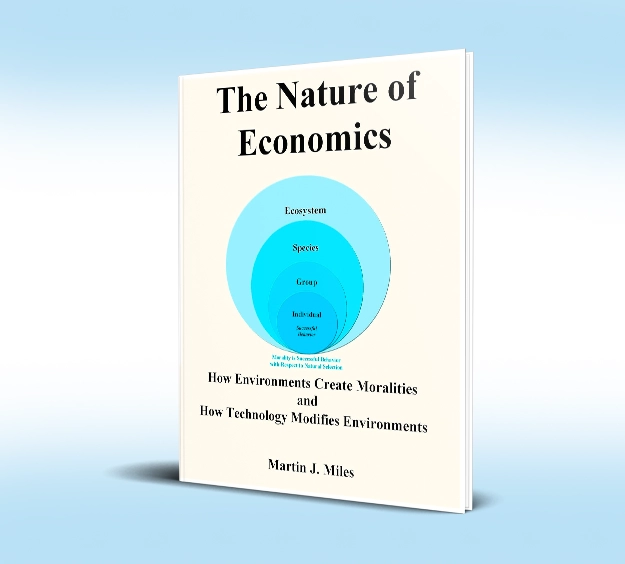About Book
How Environments Create Moralities and How Technology Modifies Environments
My motive for writing this book was to understand economics through nature. Individuals, organizations, and politicians (i.e., their agents) continually damage economies by obtaining unearned benefits. I felt by understanding economics through nature I could show how really damaging it is. I started with the Big Bang. Not surprisingly, I first encountered the laws of thermodynamics: Energy naturally flows to regions of lesser energy. Clearly, replenishing our continual loss of energy requires a healthy economy. True, but my search revealed so much more. In 1859, Charles Darwin published his seminal work, On The Origin of Species. He recognized the relationship between economics and ecology and borrowed some ideas from economics. The esteemed Harvard evolutionary biologist, Edward O. Wilson, believes that the social sciences and the humanities make sense only in light of evolution. I agree enthusiastically. Natural selection, the driving force behind evolution, designs individuals to conform to their environment. Additionally, many evolutionary biologists believe (as Darwin suspected) that in social species, such as humans, group selection also occurs. That is, members of a group (i.e., family and friends) would help a seemingly deficient member of the group survive because, doing so, might increase the probability that the group will survive. The degree of cooperation between two individuals tends to be inversely correlated with the genetic distance between them.
Moralities
Natural selection designs an individual to conform to its environment. A primary purpose of this book is to show that moral behavior for a society is simply its successful behavior with respect to natural selection. That is, our morality is designed by natural selection to conform to our environment – and there are countless environments.
Free Market Economy
Realizing this inherent link between morality and survival should change how we view willful human manipulation and deformation of our economies. In fact, the implications of this inherent link are vast. This book shows that the free market economy is the moral economy because it is the economy in which individuals can most likely be successful. We define the free market in terms of accuracy.
The Nature of Economics
What makes an economy truly moral and sustainable?
In The Nature of the Economy, author Martin J. Miles explores how the laws of nature thermodynamics, evolution, and ecosystems intersect with human behavior, morality, and technology to shape societies and economies.
Spanning from the Big Bang to modern capitalism, this groundbreaking work uncovers:
Why natural selection is the foundation of morality.
How ecosystems provide the first sustainable economy.
The rise of human cooperation, competition, and group morality.
The disruption caused by technology, from ancient tools to modern machines.
Why the free market economy is the moral economy.
The challenges of redistribution, job loss, and automation.
The urgent need for new moralities to face ecological and technological disruptions.
This book isn’t just about economics—it’s about survival, morality, and the search for truth in a rapidly changing world.
Key Themes
Nature as the First Economy
The laws of thermodynamics and entropy.
Evolution of organisms and ecosystems as models of sustainability.
Evolution of Morality
How natural selection shaped both individual and group morality.
Transition from group morality to species morality as societies grew.
Four Iconic Economies
Natural Economy – 3.5 billion years of ecosystems.
Free Market Economy – revealing true value with minimal control.
Ancient Economies – empires shaped by political power.
Modern Economies – technology-driven but politically constrained.
Political Control vs. Morality
How fiscal and monetary policies distort economies.
The moral consequences of redistribution and unearned benefits.
Technology & the Future
Technology’s role in creating moral hazards.
Innovations that destroy more jobs than they create.
The rise of “möbots”—machines that produce but do not consume.
The urgent need for ecosystem morality to preserve humanity and the planet.
Who Should Read This Book?
Students of economics, philosophy, and ecology.
Policy makers seeking insights into sustainability.
Business leaders exploring the moral dimension of markets.
Readers curious about the relationship between nature, technology, and society.
Praise for the Book
“A refreshing and deeply researched perspective on economics that connects science, morality, and sustainability. Essential reading for thinkers and leaders.”


